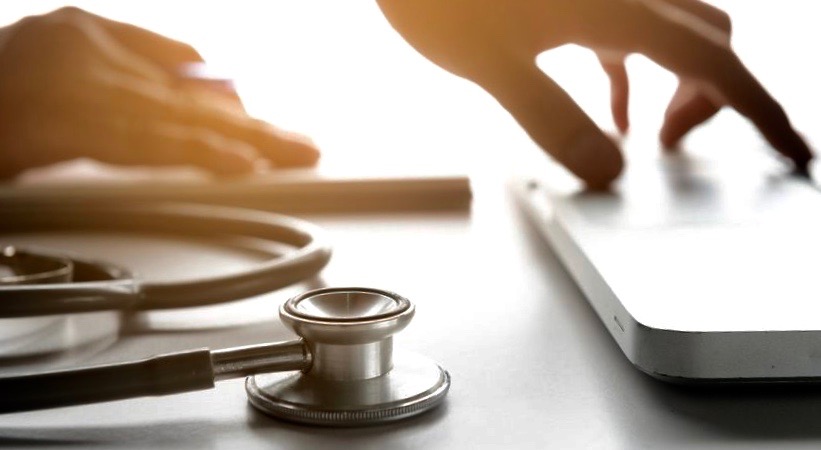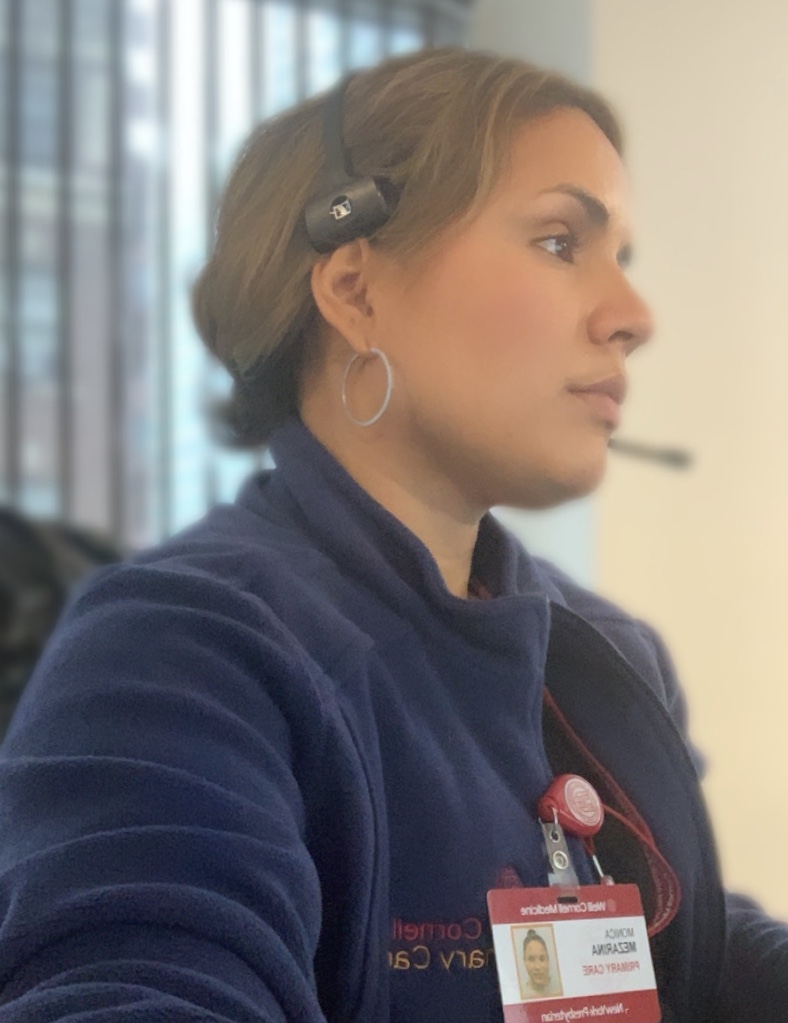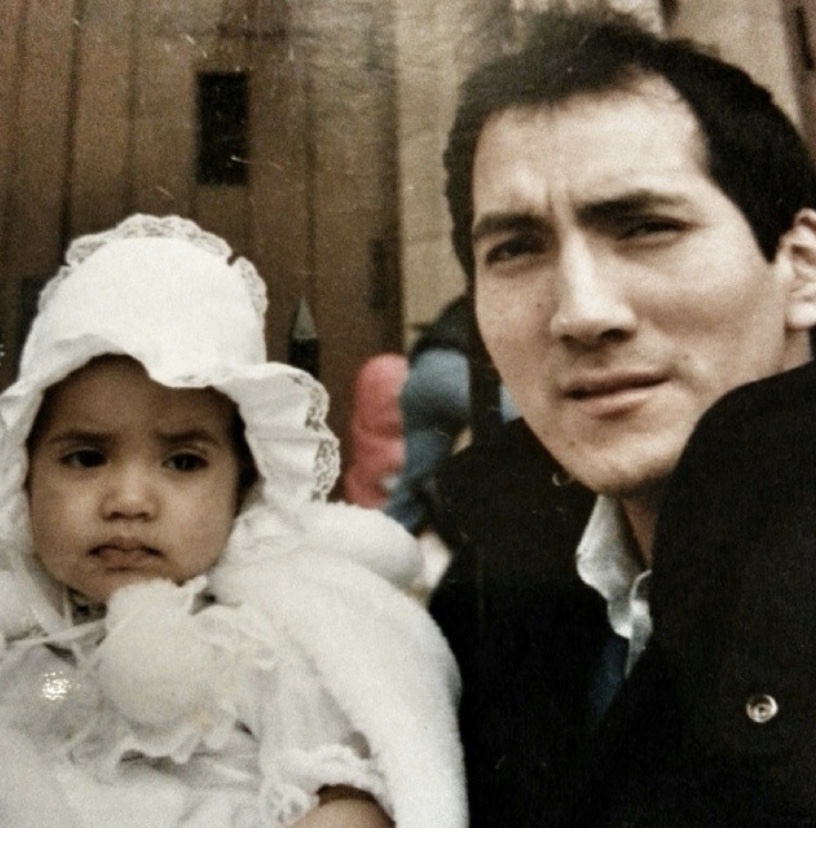
March 26, 2020
Science for Health Professionals major Monica Mezarina was juggling work, family and school when a global pandemic got added to the mix. A medical receptionist in a multi-doctor suite at a major hospital in lower Manhattan, her life quickly changed as the city shifted to accommodate the approaching crisis.
“Normally I’m the first person you see when you walk into the doctors’ office,” she says. “I look at your ID, see if we have to do an authorization with your insurance, that kind of thing. I work with pediatric patients, so I’m often arranging for them to see specialists.”
As the virus began to emerge in New York City, her responsibilities shifted.
“I’m considered essential and I have to go to work, but they’re trying to minimize our exposure,” Mezarina says. “I’ve gone from our medical offices in Lower Manhattan to a call center near Wall Street, and we’re taking a lot of calls from people who think they have the coronavirus.”
 She says that in order to screen the callers, “We ask things like, ‘Do you have a fever?’, ‘Do you have shortness of breath?, ‘Do you have a rash or COPD?’ We try to identify these and other issues that put people in a higher-risk category. Then we set them up with video to see a doctor who will determine if they need to get admitted to the hospital and tested.”
She says that in order to screen the callers, “We ask things like, ‘Do you have a fever?’, ‘Do you have shortness of breath?, ‘Do you have a rash or COPD?’ We try to identify these and other issues that put people in a higher-risk category. Then we set them up with video to see a doctor who will determine if they need to get admitted to the hospital and tested.”
The call volume is unrelenting. “It’s difficult in the sense that you have no time in between,” she says. “If someone calls and you need to send a message out to get them a video visit, you have to do it while you’re still on the phone with them. And meanwhile the next call comes in.”
Determination to stay on track characterizes her higher education and career goals
When asked if she worries about her own safety as she commutes to work while much of New York City is shut down, Mezarina says no — though she does worry about medical staff still at the hospital. And despite the terrifying reality of a viral outbreak that is overwhelming the medical community fighting to contain it, Mezarina is resolute about her career goal to work in hospital administration.
She started her higher education at Metropolitan College of New York, majoring in social work, and after three years, left to give birth to her daughter. Eventually, she found herself working for a major hospital — which not only has had an impact on her career goals, but also provides tuition reimbursement, enabling her to enter BMCC’s Science for Health Professions program.
“My first semester at BMCC I took a full load, but it was hard to manage all the reading while I was working full time,” she says. “It was hard to do group projects, because I didn’t have the kind of time outside class to meet with people.”
Undaunted, Mezarina adjusted her academic schedule till she found the right balance.
“I dropped one class, so I had just three, then I took a class in the winter session,” she says. “Now I’m taking biochemistry and human geography, which have switched to online.”
As it turns out, distance learning is a good fit for Mezarina. “It’s easier to ask the professor a question in Zoom than in our regular class,” she says. “Maybe that’s because it feels like it’s just you and her, even though everyone is technically there, and I feel like I can email her questions now, which I wouldn’t have done before.”
Also, she says, “It’s interesting being able to see everybody. It’s kind of cool. You’re really focused. It’s hard to be distracted because you’re staring at the computer screen.”
All that said, she admits to being a little worried about taking chemistry through distance learning.
“I had chosen not to take that one online because I thought it would be hard for me, and here I am taking it online anyway, but I think our professor understands. She postponed one of our tests and she’s posting our Excel lessons online, which is like what she used to do in the classroom with a projector, so we can follow everything.”
Building resiliency for life, as a child in foster care
Adapting to change is a strength that Mezarina relied on, growing up in the foster care system. “I was in from age four to 21,” she says. “I was fostered in homes in the Bronx, Brooklyn and Queens.”
At 16, she entered a group home in Staten Island, and that was her favorite placement. “I’m still friends with some of the kids I lived with,” she says. “I feel like they are the family I chose for myself.”
 A few years ago, she sought out her father, who lives in Peru.
A few years ago, she sought out her father, who lives in Peru.
“When I was young and lived with my mom till age 4, I remember my dad being a part of my life,” says Mezarina.
Though her father had been incarcerated and eventually deported, she was able to find him on social media. “I sent him a message on Facebook, with a picture of me as a baby with him. I said in Spanish to him, ‘Do you know who I am?’ and he said, ‘Of course I do,’ and he was so happy that I reached out to him.”
When Mezarina’s mother passed away this past January, her younger sister moved in with her. Around the same time, the family’s grief was deepened even further by the death of her teenage daughter’s biological father.
Throughout this difficult time, Mezarina has remained optimistic about her classes at BMCC and long-term goals. As the corona crisis ratchets up in intensity every day in New York City, she balances her course assignments, her job, her family — and the looming threat of a viral pandemic.
“I don’t feel like I’m invincible, but I feel like you know what to do, and even though it’s not 100 percent certain that you’re safe from getting the virus, I’m not the type of person that panics,” she says. “All I can do is follow proper protocols, follow the six-foot rule and wash my hands and face. I’m doing the best I can do. I take it as part of my job.”
STORY HIGHLIGHTS
- Science for Health Professionals major Monica Mezarina was juggling work, family and school when a global pandemic got added to the mix
- Along with other medical office staff, she was moved to a call center to handle the flood of calls from patients suspecting they have been infected
- Mezarina screens patients and connects them to doctors via video visits

